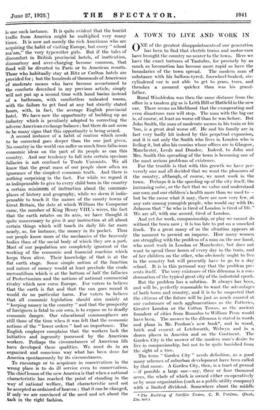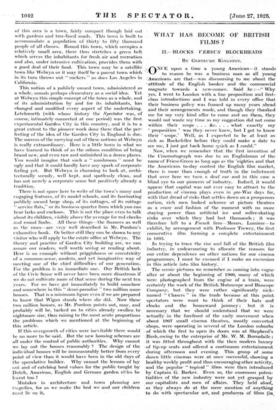A TOWN TO LIVE AND WORK IN O NE of the
greatest disappointments of our generation has been to find that electric trains and motor-cars have brought the country no nearer to the town. Here we have the exact tortures of Tantalus, for precisely by as much as locomotion has become more rapid so have the boundaries of the town spread. The modern man of substance with his balloon-tyred, fourwhecl-braked, six- cylindered car is not able to get to grass,. trees, and thrushes ' a moment quicker than was his grand- father.
Rural Wimbledon was then the same distance from the office in a tandem gig as is Leith Hill or Hatfield in the new car. There seems no likelihood that the exasperating and even disastrous race will stop. The man with the big car is, of course, at least no worse off than he was before. But JohnSinith, the man of moderate means in his train or his 'bus, is a great deal worse off. He and his family are in fact very badly hit indeed by this perpetual expansion, and it is not only the Smith who lives in London who is feeling it, but also his cousins whose offices are in Glasgow, Manchester, Leeds and Dundee. Indeed, to John and Mrs. Smith this spreading of the town is becoming one of the most serious problems of existence.
For the trouble is that with this growth we have per- versely one and all decided that we want the pleasures of the country, although, of course, we must work in the town. Perhaps it is the speeding up of the city itself, the increasing noise, or the fact that we value and understand our own and our children's health more than we used to-- but be the cause what it may, there are now very few, at any rate among youngish people, who would say with Dr. Johnson that " he who is tired of London is tired of life." We are all, with one accord, tired of London.
And yet for work, companionship, or play we cannot do without the town now ; it is too late to put on a smocked frock. To a great many of us the situation appears at the moment to present an impasse. How many women • are struggling with the problem of a man on the one hand, who must work in London or Manchester, but does not want to spend three hours of every day in the train, and of her children on the other, who obviously ought to live in the country lnit will presently have to go to a day school. It is in this personal way that the problem pre- sents itself. The very existence of this dilemma is a con- demnation of the typical great city of the industrial epoch.
But the problem has a solution. It always has been, and will be, perfectly reasonable to want the advantages of both town and country, and it is to. be suspected that the citizens of the future will be just as much amazed at our endurance of such agglomerations as the Potteries, Greater 'London or the Cotton Towns, as the ancient founders of cities from Romulus to William Penn would 'have been. The answer to the dilemma is stated in words and plans in Mr. Purdom's new book*, and in wood, brick and cement at Letchworth, 'Welwyn and in a dozen places in America and on the Continent. The Garden City is the answer of the modern man's desire to live in companionship, but not to be quite banished from the sight of a tree.
The term " Garden City " needs definition, as a good many schemes of suburban development have been called by that name. A Garden City, then, is a tract of ground —if possible a large One—say, three or four thousand acres, the whole of which is owned either co-operatively or by some organization (such as a public utility company) with a limited diVidend. Somewhere about the middle * The Building of Satellite Towns. C. B. Purdom. (Dent, 25s. net.1 of this area is a town, fairly compact though laid out with gardens and tree-linea roads. This town is built-to accommodate a population of thirty to fifty thousand people of all classes. Round this town, which occupies a relatively Small area, there thus stretches- a green belt which serves the inhabitants for fresh air and recreation and also, under intensive cultivation; provides them with a good deal of their food. This town may be a satellite town like Welwyn or it may itself be a parent town which in its turn throws out ." suckers " as does Los Angeles in California.
- This notion of a publicly owned- town, administered as a whole, sounds perhaps elementary as a social idea. Yet at Welwyn thiS simple concept of the town as a whole, and of its administration by and for its inhabitants, has changed and modified every aspect of the undertaking. Letchworth (with whose history the Spectator was, of course, intimately connected at one period) was the first experimental Garden City in this country, and it is to a great extent to the pioneer work done there that the per- fecting of the idea of the Garden City in England is due. The success of the carrying out of these notions at Welwyn is really extraordinary. Here is a little town in what we have learned to think of as the odious condition of being . brand new, and even raw and unfinished in a dozen places. You would imagine that such a " mushroom " must be ugly and that it could hardly have any spark of corporate feeling yet. But Welwyn is charming to look at, archi- tecturally seemly, well kept, and spotlessly clean, and has not merely a corporate sense but positively already a tradition.
There is not space here to write of the town's many and engaging features, of its model schools, and its fascinating publicly owned large shop, of its cottages, of its cottage " service flats," or its business quarter from which you can hear larks and cuckoos. This is not the place even to talk about its children, visibly above the average for red cheeks and round limbs. All these things—the finances as well as the roses—are very well described in Mr. Purdom's exhaustive book. Or better still they can be shown to any visitor who will apply to the estate office at Welwyn. The theory and practice of Garden City. building are, we can . assure our readers, well worth seeing or reading about. Here is an example without priggishness or eccentricity of a common-sense, modern, and yet imaginative way of - meeting one of the chief difficulties of our generation. For the problem is an immediate one. Our British lack . Of the Civic Sense will never have been more disastrous if we do not cultivate more of that sense during the next ten years. For we have got immediately to build somehow and somewhere in this " demi-paradise " two million more houses. That is a minimum figure even if we are prepared . to know that Wigan stands where she did. Now these two million houses, as Mr. Purdom points out, may, and probably will be, tacked on to cities already swollen to nightmare size, thus raising to the most acute proportions the problems which we mentioned at the beginning of this article.
If this overgrowth of cities were inevitable there would . be no more to bc=said. But the new housing schemes are all under the control of public authorities. Why cannot we lay out the houses reasonably ? The design of the individual houses- will be immeasurably better from every point of view than it would have been in the old days of the speculative builder. Why cannot the lessons of lay out and of catching land values for the public taught. by Dutch, American, English and German garden cities be learnt too ?
Mistakes in -architecture and . town planning are tragedies, for as we make the bed we and our children must lie on it.











































 Previous page
Previous page